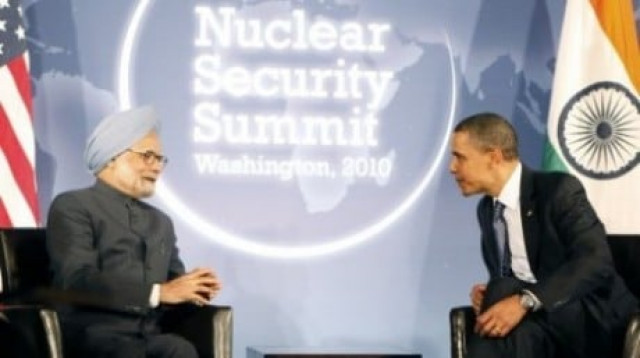India presses on Pakistan as Obama courts rivals

On the eve of a 47-nation summit on nuclear security, Obama met separately with Prime Ministers Manmohan Singh of India and Yousuf Raza Gilani of Pakistan who lead two of the newest members of the club of nuclear weapons states.
US relations with India have warmed markedly in the past decade, with US leaders across the spectrum embracing an alliance with the world's largest democracy. Obama in November honoured Singh with the first state dinner of his presidency.
In Obama's earlier meeting with Singh, the Indian and US leaders "vowed to continue to strengthen the robust relationship between the people of their countries," White House spokesman Robert Gibbs said. Indian Foreign Secretary Nirupama Rao, who attended the meeting, gave a positive assessment to the meeting with Obama and said the two leaders agreed to cooperate in areas from reducing poverty to rebuilding Afghanistan.
But Rao said that India also wanted the United States to turn up the heat on Pakistan to rein in Lashkar-e-Taiba, the Islamist movement accused of carrying out the grisly siege of Mumbai that left 166 people dead.
Singh told Obama "that unfortunately there was no will on the part of the government of Pakistan to punish those responsible for the terrorist crimes in Mumbai of November 2008," Rao told reporters. "This is where the partnership of India and the United States could make a difference," she said.
Addressing one sore point, Rao said that Obama was "fully supportive" of India's request for access to David Headley -- the US-born son of a former Pakistani diplomat who admitted scouting sites in Mumbai for the attacks.
US prosecutors have promised not to extradite Headley in return for his guilty plea, setting off indignation among Indians who wondered the reaction if the United States were denied access to a culprit of the September 11 attacks.
Despite concerns about Lashkar-e-Taiba, the Obama administration has welcomed what it sees as a stronger response by Pakistan in cracking down in other extremist groups including homegrown and Afghan Taliban.
C. Raja Mohan, a leading Indian analyst, said he saw a growing recognition in the United States that Lashkar-e-Taiba posed a threat to US interests and not just to India. "But how much the US can act on it and get the Pakistani army to act on it, I'm not so sure," said Mohan, a visiting scholar at the Library of Congress.
Mohan said that the Obama administration could dispel some lingering distrust in India by taking up a new project between the two countries.
The two nations just last month completed one of the last hurdles to implementing a 2008 agreement on nuclear cooperation -- a hallmark of the former George W. Bush administration's engagement of India.
"What we need is to show some big progress on the US-India side. We're still trying to finish the old Bush agenda," Mohan said. India and Pakistan in February reopened talks cut off after the Mumbai attacks. But India in particular has been cautious about the dialogue and officials said there were no plans for Singh and Gilani to meet in Washington.



















COMMENTS
Comments are moderated and generally will be posted if they are on-topic and not abusive.
For more information, please see our Comments FAQ